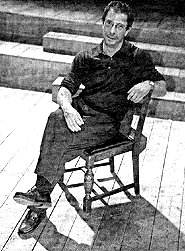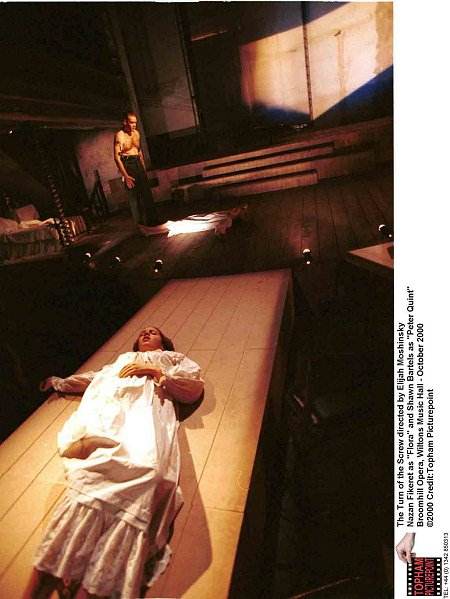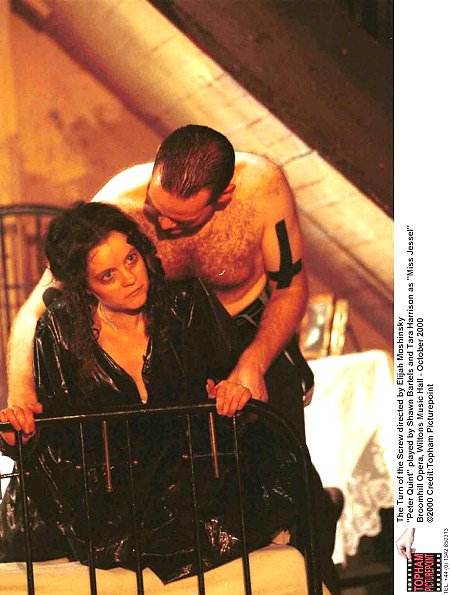
The story by Henry James may not be read often nowadays, but Benjamin
Britten's treatment of it has become a core repertoire opera, arguably
one of the greatest of the century now ended, and rarely off the stage somewhere.
It works in large opera houses and in small scale productions. Its ambiguities
make it perennially fascinating, and there is scope for a wide range of
interpretation.
The Britten/Piper The Turn of the Screw is musically complex, and its scenes structured so subtly as to repay the most detailed study, but in the theatre one is quickly swept into the drama and involved with the predicaments, experiences and imaginations of the cast of adults, children and ghosts. What is happening? What has happened in the past? How did it come that 'the ceremony of innocence' had been drowned in this dysfunctional household, with the children's 'guardian' now mysteriously absent?
There was a memorable previous production of The Turn of the Screw by Broomhill Opera (October 1996) in the eponymous Broomhill, the company's first home at an estate full of follies near Tunbridge Wells, which boasted a perfect opera theatre and a water tower where the ghost of Peter Quint might well appear. The conductor, then as now, was Charles Hazelwood. Under his guidance at Wilton's Music Hall, the youthful instrumental ensemble of 13, with substitutes for two of the better known names the evening we were there, presented the score with confidence; one felt that for Hazelwood this is a very special opera.

[Elijah Moshinsky on set at Wilton's Music
Hall]
In Elijah Moshinsky's new production for Broomhill Opera it is all stark and less equivocal than often elsewhere. We are left in no doubt that there had been sadistic sexual activity at the country house, with domination by the deceased valet and governess of the two children. Shawn Bartels, suave with beautifully modulated tenor delivery as the narrator, becomes crude and hard as a tattooed, topless psychopathic Quint, and we are shown what may have sent Miss Jessel (Tara Harrison), seduced and abandoned, to her suicide, returning from the dead to relive what she had endured, and to the girl Flora (Nazan Fikret) who had been drawn into the ring of paedophilic activities which, in turn, we are led to presume, had led to the boy Miles's expulsion from school, guilt and finally, at a moment of confrontation, his death. These two thirteen year olds were ideally cast and sustained their roles completely in character and with assured singing; Miles may never have been portrayed more convincingly than by Jonathan Darbourne, though previous boy singers have taken on this disturbing and demanding role and gone on to distinguished careers.
The Governess, who does not understand her own motivations or know what to believe of what she experiences, is portrayed with intense singing and impressive completeness by Alison Rae-Jones, a fine assumption of one of the most complex and rewarding roles in all operas. Her more down-to-earth and incredulous working colleague, Mrs Grose, is played ideally by Carol Rowlands, who took the part in the earlier Broomhill production.
Fine though that was, it has now been capped by Philip Witcomb and Elijah Moshinsky's imaginative yet economical use of all the spaces at Wilton's Music Hall, a place itself full of ghosts of the Victorian past. A huge revolving mirror serves to hint at the labyrinthine mansion in which evil becomes manifest. A central walkway made parts of the action come close to every member of the audience, and it was a master stroke to make positive use of the echoing barrel-vaulted gallery (which can compromise word-clarity) for some of the seductive, ghostly singing of Peter Quint.
Moshinsky seems to be fired by budgetary constraints (he came to notice in 1975 when Covent Garden, strapped for cash, brought him in to revive Peer Grimes - his Brechtian 'poetic realism' changed production styles for Britten operas thereafter). Moshinsky's national and international credits are impressive, but those listed omit one Britten opera production on a shoe-string, which is firmly lodged in my memory; his Paul Bunyan at Dulwich College (1996) completely upstaged the later one by the Royal Opera. And, to come back to Broomhill Opera, their brilliant production of Rossini's Il Turco in Italia in Horsham (Simon Callow, 1997) deserves to be revived, and has many lessons for ENO's The Turk in Italy now playing at the Coliseum, with its clumsy, laborious updating to the world of Fellini's films, complete with excruciating with groan-jokes.
Broomhill Opera's Turn of the Screw bids fair to become one of London's hottest tickets for its remaining performances, at 7.30 on Tuesdays, Thursdays & Saturdays ONLY until 28 October. Britten's own historic 1955 recording of The Turn of the Screw is available on CD, Universal London 425 672-2LH2, and there are several more recent recordings.
This 'radical opera company founded 1993 to bring the best to the most' returns to Wilton's Music Hall for a Christmas show, a modern fairy-tale opera for 7-70 yr olds by the Austrian composer Kurt Schwetzik. Enquiries to 020 7420 0222 and opera@broomhill.demon.co
Peter Grahame Woolf
Production photographs [Topham Picturepoint]

Miles

Quint and Flora

Quint and Miles

Quint and Miss Jessel
 Return to:
Return to: